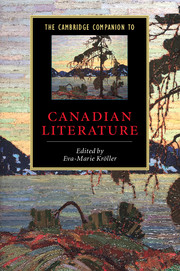Book contents
- Frontmatter
- Introduction
- 1 Aboriginal writing
- 2 Francophone writing
- 3 Exploration and travel
- 4 Nature-writing
- 5 Drama
- 6 Poetry
- 7 Fiction
- 8 Short fiction
- 9 Writing by women
- 10 Life writing
- 11 Regionalism and urbanism
- 12 Canadian literary criticism and the idea of a national literature
- Further reading
- Index
- Series List
6 - Poetry
Published online by Cambridge University Press: 28 May 2006
- Frontmatter
- Introduction
- 1 Aboriginal writing
- 2 Francophone writing
- 3 Exploration and travel
- 4 Nature-writing
- 5 Drama
- 6 Poetry
- 7 Fiction
- 8 Short fiction
- 9 Writing by women
- 10 Life writing
- 11 Regionalism and urbanism
- 12 Canadian literary criticism and the idea of a national literature
- Further reading
- Index
- Series List
Summary
A land without poetry
In The Journals of Susanna Moodie (1970), Margaret Atwood (1939-) reimagines Susanna Moodie, the nineteenth-century poet and novelist, who enters the “large darkness” that is Canada and fashions her life as a reluctant pioneer. Atwood's Moodie finds herself “a word / in a foreign language,” an apt description of someone alien in her new environment and cut off irretrievably from her old environment of England. As she confronts her new home, she meets what she sees as an uncultured landscape awaiting transformation into a cultured world.
For the real Mrs. Moodie, who arrived from England in 1832, Canada was first and foremost a land without poetry. It was not until more than thirty years later that Edward Hartley Dewart (1828–1903) would publish the first anthology of Canadian poetry, Selections from Canadian Poets (1864), designed to “rescue from oblivion some of the floating pieces of Canadian authorship worthy of preservation in a more permanent form.” Casting a wide net that included most of the recognized poets of the period, including Susanna Moodie, he proclaimed that poets should be national heroes, though they would probably go unrecognized in such a young country as Canada: “if a Milton or a Shakspere . . . was to arise among us, it is far from certain that his merit would be recognized.” Canadians, he asserted, must be aware of the vitality and the significance of the poetic mind.
- Type
- Chapter
- Information
- The Cambridge Companion to Canadian Literature , pp. 135 - 154Publisher: Cambridge University PressPrint publication year: 2004
- 1
- Cited by

